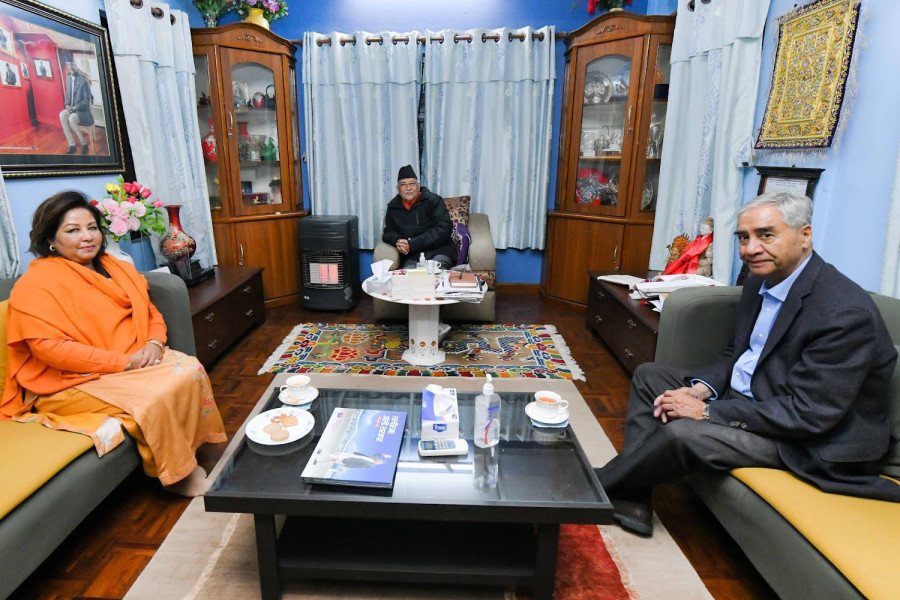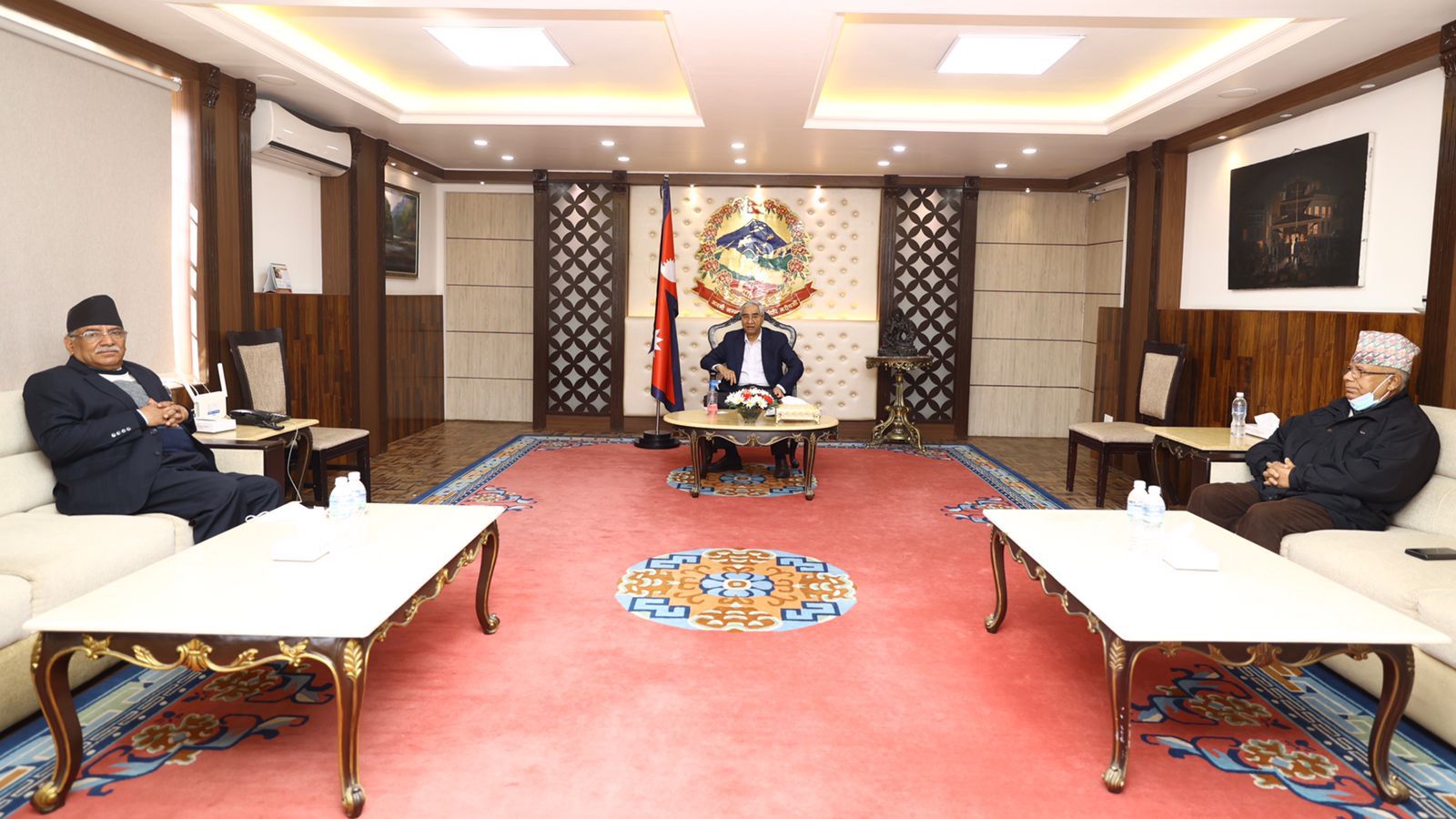National
Deuba reaches out to Oli after ruling alliance fails to find consensus on MCC
Coalition split looms as Congress and UML explore options after tough Maoist stance against US grant’s ratification.
Anil Giri & Tika R Pradhan
Chances of finding an agreement in the ruling coalition on the Millennium Challenge Corporation-Nepal Compact seem to have faded, and if the partners fail to find a common ground by Friday morning, the five-party alliance is set to fall apart.
Thursday’s meeting of the coalition partners held at Baluwatar ended inconclusively even though it was said to be a decisive one.
Immediately after the meeting, Prime Minister Sher Bahadur Deuba made a dash for Balkot to meet with KP Sharma Oli, chairman of the main opposition CPN-UML.
While the ruling coalition has set another meeting for Friday morning, Deuba’s sudden dash to Balkot may mean the coalition is hanging by a thread.
Congress leaders said Deuba is exploring options now as he is committed to tabling the $500 million American grant agreement in Parliament.
The Maoist Centre’s objection on Wednesday had forced Deuba to backtrack on his plan to table the $500 million compact in Parliament.
Deuba decided to stall his plan after the Maoist chair sought one more meeting of the coalition partners. But he seems to have sensed that a consensus among the ruling partners was unlikely on the MCC compact, given their tough stance.

The Maoist Centre and the CPN (Unified Socialist) are opposed to MCC compact’s tabling without amendments to some of its provisions.
Earlier on Thursday, two Nepali Congress leaders—Gyanendra Bahadur Karki, minister for communications, and Minendra Rijal—had met with Oli and discussed the possible power-sharing deal with the UML.
Sources said that US Ambassador Randy Berry also spoke with Oli on Thursday morning.
“Now we have realised that the solution to the ongoing crisis cannot be found within the coalition so we have reached out to the UML,” Rijal told the Post. “The Maoist Centre is considering quitting the government while continuing support by remaining outside. But that’s not possible.”
Maoist chair Dahal appears to be doing multiple dealings so as to ensure that he continues to be part of the coalition even as he maintains his posturing against the MCC to appease his party members, who are opposed to the American compact.
For Deuba, things, however, have increasingly become difficult.
Pressure has grown from Washington to ratify the compact by February 28, the deadline he set along with Dahal through a letter to the MCC headquarters on September 29 last year.
As Dahal has backed out, Deuba is left alone to fulfil the commitments he made.
But Deuba has fallen between two stools. He cannot table the compact as long as the Maoist Centre opposes it; if he tables it at the cost of the coalition, there’s a risk of the Maoist Centre joining hands with Oli.
The interlocutors trying to broker an agreement between Deuba and Oli said that some kind of a blueprint is being worked out.
“A deal between the Congress and the UML is very close,” said one of the interlocutors.
The likely deal is that even if the Maoist Centre pulls out of the government, the UML won’t seek to form a government as the single largest party, while it will support Deuba to table the MCC compact in Parliament.
Both Deuba and Oli, according to a Nepali Congress office bearer, discussed multiple issues during their meeting.
“From tabling the MCC compact to impeachment motion against Chief Justice Cholendra Sumsher Rana to power-sharing deal in provincial governments… the two leaders had candid talks,” said the office bearer. “This meeting has set the tone for future political cooperation between Deuba and Oli if the alliance breaks down.”
To overcome the obstacle that could be posed by Speaker Agni Sapkota, a long-time ally of Dahal, a motion to remove him would be moved by the Congress and the UML jointly, according to at least two interlocutors from both the parties.
Deuba will wait until Friday’s meeting of the coalition though, a Congress leader said.
The ruling coalition ended its meeting on Thursday evening by agreeing to sit again.
“Top leaders have agreed to sit again at nine in the morning tomorrow [Friday],” said Congress General Secretary Gagan Thapa. “If there is no agreement among the alliance partners on the MCC, the political course is likely to change.”

At Thursday’s meeting, Deuba, according to sources, told the coalition partners, especially the Maoist Centre, in clear terms that if the Speaker refuses to cooperate, the Congress party will join hands with the UML to get rid of him.
The UML has its own axe to grind against Sapkota, as he had refused to act as per the party’s decision to expel 14 of its lawmakers who later split and formed the CPN (Unified Socialist).
“Our position is clear… let’s remove the Speaker and get MCC ratified from the House,” Gokul Prasad Baskota, who is one of the interlocutors from Oli’s side, told the Post. “If the current coalition breaks down, the UML will extend support to the Deuba government to save it as it will fall into a minority.”
According to Baskota, once parliamentary polls are announced some time later, the party could become part of the election government.
Deuba appears to be very clear about tabling the MCC compact.
Earlier on Thursday afternoon, Deuba said that the compact may pass or may not pass [from Parliament] but it needs to be tabled in Parliament.
“MCC may pass or may not but it is true that it is in the best interest of our nation,” said Deuba at a book launch in Kathmandu on Thursday. “I'm doing my best to endorse it.”
At the coalition meeting on Thursday evening, according to leaders, Dahal continued to maintain a tough stance against the compact despite Deuba requesting that he should agree at least for its tabling.
Dahal, according to the Congress General Secretary Thapa who was present in the meeting, said that the compact cannot be registered until House obstructions [by the UML] are lifted.
Communication Minister Karki told the Post that serious discussions were held at the coalition’s meeting on ways to convince the opposition to lift House obstructions and table the MCC.
“The prime minister was very clear in his position that the MCC compact must be tabled and ratified by February 28,” said Karki.
Baburam Bhattarai, chairman of the Federal Council of Janata Samajbadi Party, said that both the Maoist Centre and the CPN (Unified Socialist) stood against tabling the MCC compact despite the prime minister’s repeated insistence that the sovereign Parliament be allowed to take a final decision.
“We also said that a way out could be found after tabling it in Parliament asking the main opposition to support it,” Bhattarai, who was present in the meeting, told the Post.
The next meeting of the House of Representatives has been scheduled for Friday.
At the coalition meeting, Thapa also proposed passing a resolution motion with a commitment that Nepali parties would discontinue their partnership with the MCC should there be something unwarranted conditions attached.
“My proposal was meant to convince the coalition partners as they continued to maintain a hard stance,” said Thapa. “The meeting then ended without any conclusion.”




 18.12°C Kathmandu
18.12°C Kathmandu















